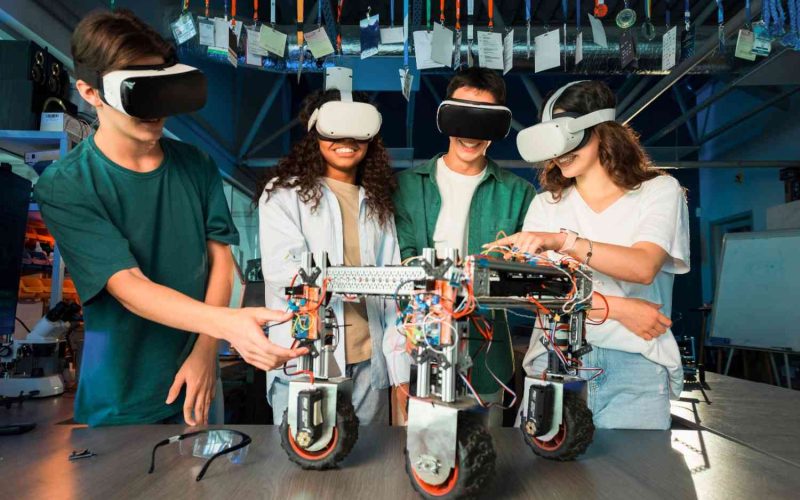Introduction
Robotics and automation are now a big part of industries like manufacturing, services, and logistics, changing how they work. The global industrial robotics market is expected to grow to $70 billion by 2030, creating many new job opportunities.
Today, robots are commonly used in factories and warehouses, and they are even starting to be used in construction. Because of this, companies can now do large amounts of work more easily and make their processes more consistent.
So, if someone has finished a diploma and wants a stable career in the future, studying industrial robotics is a smart and valuable choice.
What is Industrial Robotics?
Industrial robotics involves designing, building, and using robots that perform tasks in factories and industries. These robots can do repetitive, dangerous, or precise work faster and more accurately than humans.
Examples include robotic arms assembling cars, robots packaging goods, and machines inspecting products for quality. Industrial robots help companies increase productivity, reduce errors, and improve worker safety.
Why Choose an Industrial Robotics Program After Diploma?
If you have completed a diploma in engineering, electronics, mechanical, or related fields, adding industrial robotics skills can open many doors. Here are a few reasons why this program is valuable:
1. High Demand for Skilled Professionals
Many industries are adopting automation to stay competitive. This has created a growing need for workers who understand robotics and can operate, maintain, or program these machines.
2. Good Salary and Job Security
Jobs in industrial robotics often come with attractive salaries because of the technical skills required. As robots become more common, these skills will be in high demand, offering long-term job security.
3. Work in Diverse Industries
Robotics experts are needed in various sectors like manufacturing, automotive, electronics, pharmaceuticals, and even agriculture. This diversity allows you to choose where you want to work.
4. Chance to Work with Cutting-Edge Technology
If you love technology and innovation, industrial robotics will keep you engaged. You will work with sensors, controllers, computer programming, and artificial intelligence.
What Will You Learn in an Industrial Robotics Program?
A good industrial robotics program teaches both theory and hands-on skills. Key topics usually include:
- Basics of robotics and automation
- Mechanical design of robots
- Electrical circuits and sensors
- Programming languages like PLC (Programmable Logic Controller) and Python
- Robot operating systems and control systems
- Safety standards and maintenance
- Troubleshooting and problem-solving techniques
The program often includes practical training in labs or industry internships to give real-world experience.
Why to Join Robotics Revolution Now?
The industrial robotics program is becoming very popular among both students and working professionals. This is because it not only helps people get jobs quickly, but also prepares them for the future, especially with the rise of the Fourth Industrial Revolution.
Big manufacturing companies now depend on robots for many tasks. What once seemed like science fiction is now a part of everyday life. These companies use robots for accurate manufacturing, quality checks, and moving goods, which is creating many job opportunities.
And it’s not just in factories. Robots are also used in healthcare, farming, and construction. For example:
- In healthcare, surgical robots help doctors perform precise surgeries.
- In agriculture, robots help with watching crops and harvesting.
- In construction, robots are used for difficult building work.
Why Pursue an Industrial Robotics Program After a Diploma?
The growing demand for skilled robotics professionals and the wide range of job options in different industries make studying industrial robotics after a diploma a smart choice.
Diploma holders often have an advantage over those with only a bachelor’s degree because they already have hands-on technical knowledge, which makes it easier to learn practical robotics skills.
The industrial robotics program helps students build on their existing skills and learn more about modern automation technologies. The course focuses on real-world problem-solving, using robotics equipment, and integrating systems—teaching practical, job-ready skills instead of just theory.
Some Prominent Reasons to Pursue Robotic Program
- Multiple Career Opportunities: Industrial robotics program after diploma open job offers in diverse industries like healthcare, manufacturing, agriculture, defense, energy, and space. The candidates can be hired for both designing and maintenance of robots.
- Surge in Demand for Skilled Professionals: The growing industrial robotics market is generating huge demand for skilled professionals who are proficient in advanced robotics technology.
- Hands-on Experience: Diploma holders do possess some technical knowledge, but the industrial robotics program provides them with practical exposure through hands-on projects to provide participants with real-world experiences.
- Knowledge of Advanced Technologies: The specialized industrial robotics program equip participants with the emerging skills like AI and automation to position them at the forefront of technological evolution.
- Attractive Pay Package: Diploma holders after pursuing an industrial robotics program will become eligible for a higher position in the industrial robotics field that will reward them with an attractive pay package.
Career Opportunities in Industrial Robotics
After completing an industrial robotics program following a diploma, candidates can get many well-paying jobs, such as:
- Robotics Technician: This is an entry-level job. Technicians take care of robots by maintaining, fixing, and operating them. They do regular maintenance and solve technical problems to keep robots working well.
- Automation Engineer: These engineers design and set up automated systems in factories. They choose the right robots, study production needs, and oversee the installation and startup of the systems.
- Robotics Programmer: Programmers write the software that controls robots. They create custom programs to make robots work efficiently for specific tasks and improve how robots move and perform.
- Robotics Consultant: Experienced professionals can work as consultants. They help companies plan how to use robots, study if robotics will work for them, and offer expert advice for different industries.
Industry Sectors Driving Demand
People who complete the industrial robotics program are needed not only in manufacturing but also in many other industries, such as:
- Automotive Manufacturing: Robots are used a lot to assemble, weld, paint, and check quality in car factories. With more electric vehicles being made, there is a growing need for skilled robotics workers in this area.
- Electronics and Technology: This industry uses robots for very precise work because electronic parts are very small. Robots do jobs that humans can’t do easily, so robotics experts are in demand.
- Food and Beverage Processing: Robots help with many tasks like mixing ingredients and packaging food to keep everything clean and safe. Because of strict safety rules, robotics professionals are needed to keep things consistent and hygienic.
- Pharmaceuticals and Healthcare: Robots help in making medicines safely without contamination. In healthcare, surgical robots and rehab devices also need experts to operate and maintain them, creating more job opportunities.
Future Outlook and Emerging Trends
The industrial robotics market is expected to grow a lot in the next few years. This is because more companies in the electronics and automotive industries want automation, factories are expanding, and governments are supporting programs like “Make in India.”
New technologies like artificial intelligence (AI) and collaborative robots (cobots) will help small and medium businesses use robots to save money and work better.
Robots will also use 5G internet, edge computing, and smart AI to work faster and smarter. Cobots are easy to program, cheaper to install, and can work safely alongside humans without big changes to existing machines. This makes it easier for smaller businesses to start using robots.
Also, companies are using IoT sensors and machine learning to predict when machines need fixing, which helps avoid breakdowns and lowers repair costs.
Conclusion
Doing an industrial robotics program after a diploma is a smart and profitable choice for those who want a career in automation and technology. There is a big demand for robotics experts in many industries, and the jobs pay well, making this field great for people who like technical work.
Diploma holders who want to mix technical skills with creativity can join this program to learn problem-solving and keep up with new technologies. The industrial robotics program opens doors to leadership roles and career growth.
This program gives students the skills and knowledge they need to succeed in a world that is becoming more automated.












